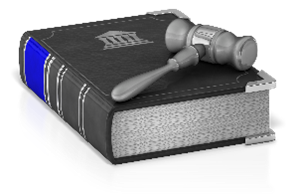
Civil Appeals Process
This is a general overview of a civil appeal and the typical process. More detailed information is provided in the Guide for Self-Represented Appellants and Appellees. Other resources are available on this website such as a glossary, court forms, and frequently asked questions.
Case Types and Applicable Rules
- Civil appeals mostly originate from the superior court and include many types of cases such as family court matters, contract disputes, injury, eviction, wills, trusts, guardianships, conservatorships, orders of protection, and administrative actions.
- The primary set of rules governing civil appeals is the Arizona Rules of Civil Appellate Procedure. ARCAP
- In the superior court, the Arizona Rules of Civil Procedure usually govern a civil action. There are specific rules for certain types of cases such as the Arizona Rules of Family Law Procedure, Rules of Procedure for Eviction Actions, Arizona Rules of Probate Procedure, Arizona Rules of Protective Order Procedure, and Rules of Procedure for Judicial Review of Administrative Decisions. Rules Home Page
Notice of Appeal and Court Docket
- If a different party also wants to challenge the judgment or order, that party may file a notice of cross-appeal within 20 days after the notice of appeal is filed or 30 days after the judgment or order is entered, whichever is later.
-
The Court of Appeals does not automatically receive recordings or
transcripts of superior court proceedings. The
appellant must provide all certified transcripts necessary for proper consideration of the issues raised in the appeal.
ARCAP 11 The appellant must order the transcripts from a certified
court reporter or an authorized transcriber and make payment arrangements within 10 days after filing the notice of appeal
.
-
After the notice of appeal is filed, the superior court will send it, an
Index of Record, and the superior court record
ARCAP 11,
ARCAP 11.1 to the Court of Appeals (approximately 30 days). After briefing is complete, the Court will direct the clerk of the superior court to transmit additional documents filed in the superior court after the notice of appeal.
- The clerk of this Court will issue an Appellate Clerk Notice that provides the deadlines for paying the filing fee and for filing the case management statement and opening brief.
- The Court of Appeals “docket” is available on the main page of this website under Case Status. The docket provides all relevant procedural information, including the status of an appeal, deadlines, event history, judicial panel assignment, and conference date.
Parties and Filing Fees
- The party who initially challenges the decision is the “appellant” and is required to pay a $280.00 filing fee.
-
The responding party is the “appellee” and is required to pay a $140.00 filing fee. If the appellee filed a notice of cross-appeal, an additional $140.00 filing fee is required. This party is also a “cross-appellant,” and a party who responds to the cross-appeal is “cross-appellee."
”
- The clerk of the court will not accept filings from a party until the filing fee is satisfied. A party may apply for a fee waiver or deferral, if appropriate. Filing fees are nonrefundable and non-transferrable. A.R.S. § 12-302
- If the appellant fails to pay the filing fee or obtain a waiver/deferral, the Court will deem the appeal abandoned and dismiss it. ARCAP 12
Filing Documents
- Counsel for the parties must file documents electronically using TurboCourt (except for requests to file documents under seal). Parties representing themselves may file electronically, in person at the Clerk of Court office, or by mail.
- All filings must be signed by the filing party’s representative or the filing party if self-represented. Electronic signatures are allowed. ARCAP 4 and ARCAP 4.2
-
The filing party must serve (provide a copy of) the document(s) on all parties
ARCAP 4,
ARCAP 15 and file a signed
certificate of service indicating who was served, the date served, and how the document was served (e.g., mail, email, or through TurboCourt).
Certificate Form
- The appellant is responsible for filing a case management statement, any necessary transcripts, and the opening brief. The appellee may respond to the opening brief by filing an answering brief. The appellant then may, but is not required to, file a reply brief.
-
If additional time is needed to file a brief, a party may file a
motion for an extension of time.
ARCAP 15 Please review the Court’s
Policy on extension requests.
-
To request
oral argument, a party must file a request no later than 10 days after the reply brief is due or is filed, whichever is earlier.
ARCAP 18 The request should be filed as a separate document, not included in a brief.
- To seek recovery of attorney fees incurred in the appeal, a party must give notice that it intends to claim fees in the first brief—the opening brief for an appellant and the answering brief for an appellee. ARCAP 21
Jurisdiction
-
Filing a notice of appeal and paying a filing fee does not guarantee that the Court of Appeals has
jurisdiction over the appeal. The Court of Appeals’ jurisdiction is governed by statute
A.R.S. § 12-2101(A). Therefore, the Court has a duty to review the
record and determine whether it has jurisdiction over an appeal.
-
If the Court of Appeals does not have jurisdiction over an appeal, the Court usually will dismiss the appeal. In certain circumstances, it may issue an order staying the appeal that identifies a jurisdictional problem. The stay order will direct a party or parties to take action to resolve the jurisdictional problem, which may include filing additional documents with the superior court. It is important that parties read all orders and notices issued by the Court.
- The Court’s review of an appeal is limited to the record on appeal, issues raised in the superior court, and transcripts obtained by the parties. The Court almost never considers new evidence that was not presented to the superior court.
Programs Provided by the Court of Appeals
- The Settlement Conference Program is a voluntary program in which parties and their counsel participate in a settlement conference conducted by a judge to attempt to resolve their case – typically before filing briefs. Cases are selected for the program by a Court staff attorney and all parties must be willing to participate. The Court sends a Settlement Conference Program Notice to all parties with general information when it opens each new civil appeal. Parties wanting their case to be considered for the program must send an email to [email protected].
- The Pro Bono Program provides pro bono counsel to self-represented parties in appeals selected by the Court that present an issue of first impression or some complexity or otherwise warrant more developed briefing and possibly oral argument. Self-represented parties may also file a Request to Participate in the Pro Bono Program.
Case Management Statement
- The appellant must file a case management statement, which is a document that describes the appeal. The statement is due within 20 days of the Appellate Clerk Notice. The court may impose sanctions for failing to file the statement, including dismissing the appeal. ARCAP 12
- The statement must be signed, and the certificate of service must be completed.
Appellant’s Opening Brief and Appellee’s Answering Brief
- The appellant must file an opening brief, which is due 60 days after the Court of Appeals distributes the Appellate Clerk Notice. If the appellant does not timely file an opening brief, the Court will dismiss the appeal. ARCAP 15
- The opening brief is a document that lists the specific challenges to the judgment/order being appealed and provides supporting arguments for those challenges.
- The answering brief is the appellee’s response to the opening brief, which is due 40 days after the opening brief is served (if the brief is served by mail, five additional days are added to the due date). If the brief is not timely filed, the Court may submit the appeal for decision on the record and the opening brief.
- The briefs must include certain information, cite supporting documents in the Index of Record, and be in a specific format provided in ARCAP 13, ARCAP 14, ARCAP 15. More detailed instructions are provided in the Guide for Self-Represented Appellants and Appellees. A checklist for appellate briefs is also provided here.
- A signed certificate of compliance must be included at the end of the brief, certifying that the brief does not exceed 14,000 words (excluding the table of contents, table of citations, certificates, and any appendix).
- The brief must be served on all parties and include a signed certificate of service naming the parties served, the date of service, and the method of service. The method of service determines the due date for the answering brief (40 or 45 days) and the reply brief (20 or 25 days).
Appellant’s Reply Brief
- After the answering brief is filed and served, the appellant has 20 days to file a reply brief but is not required to do so.
- The reply brief is limited to addressing the arguments in the answering brief and must not exceed 7,000 words.
Cross-Appeal
- If the appellee filed a cross-appeal, the answering brief must be combined with an opening brief on the cross-appeal. ARCAP 15 The combined brief must not exceed 21,000 words.
- The appellant may file a combined reply brief/cross-appeal answering brief that does not exceed 21,000 words.
- The appellee may file a cross-appeal reply brief that does not exceed 7,000 words.
- Each brief must comply with ARCAP and must be accompanied by the certificate of compliance and certificate of service.
Conference, Oral Argument, and Decision
- The Court will rule on any request for oral argument and if granted, will set the conference and oral argument on the same date.
-
The panel will issue a decision after the appeal is conferenced. There is no time limit for the panel to issue the decision, which can be in the form of a memorandum decision, an opinion, or an order.
-
Any party may file a motion for reconsideration within 15 days after the panel issues the decision.
ARCAP 22 Any party may file a
petition for review in the Arizona Supreme Court within 30 days of the decision.
ARCAP 23 If additional time is needed to file a petition for review, a motion must be filed in the Arizona Supreme Court.
After everything is resolved, the Court of Appeals will issue either (1) a mandate ARCAP 24 regarding the memorandum decision or opinion or (2) a letter terminating the case if the appeal was resolved or dismissed by order. The appeal will then be closed.



